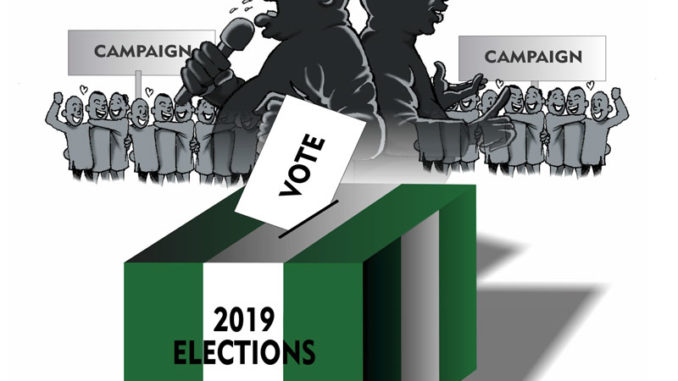
The future is precarious unless politicians end the spectre of impunity
Apparently worried by a political environment suffused with mud-slinging, rancour, incitement and hate speech, the National Peace Committee headed by a former Head of State, General Abdulsalami Abubakar last week addressed the political parties and listed conditions for peaceful elections in 2019. According to the committee, political parties and their members must “refrain from making or sponsoring public statements, pronouncements, declarations or speeches that have the capacity to incite or cause violence, before, during, and after the elections”.
Presenting the resolution of the committee, the Catholic Bishop of Sokoto Diocese, Bishop Hassan Kukah said the parties had resolved to adopt the same principles that guided the 2015 election as a template for ensuring that all stakeholders commit themselves to peaceful election in 2019. The committee and political parties discussed the need to refrain from ethnic or tribal profiling, and ensuring that politicians create a conducive environment for free, fair and credible elections in 2019. And to ensure these are heeded, the political parties would meet today to formally commit themselves to an agreement on the rule of engagement. It is an idea that we welcome and wholeheartedly endorse.
This is particularly so because with just about two months to the presidential election, the amount of abusive and inciting messages making the rounds are exasperating as politicians, especially within the ruling All Progressives Congress (APC) and the main opposition Peoples Democratic Party (PDP) make wild allegations against one another while security issues are being politicised. To worsen matters, some otherwise respected religious leaders who ordinarily should preach peace seem to have thrown both caution and public decency to the wind. Given our environment, it is very unhelpful to turn places of worship into political campaign platforms. Similarly, we share the worries of those who complain about the open partisanship of some arms of security agencies.
It has become clearly evident that these agencies are geared more towards regime protection than the promotion of national security. For instance, the Inspector-General of Police, Mr Ibrahim Idris has shown through his actions and utterances that his main preoccupation is not to ensure law and order in Nigeria but rather to get President Buhari re-elected for a second term. The role of the police in the recent Akwa Ibom House of Assembly crisis further confirmed a worrying trend. Therefore, the peace committee and indeed all the stakeholders have an additional task of impressing on the security agencies the need to be professional in their duty of securing the country for a free and credible election.
But more importantly, the Independent National Electoral Commission (INEC), assigned the crucial role of conducting a free, fair and transparent election, must do well to disabuse the minds of many Nigerians. In the last few months, particularly after the conduct of the Ekiti and Osun governorship elections, fears have been raised about the desperation of people in power. And in spite of repeated assurances by the commission, President Buhari’s refusal to assent to the Electoral Act (Amendment) bill 2018 is a major setback as it has simply complicated the work of the electoral body to effectively conduct a transparent election.
From the 2015 election, it was clear that the more automated the electoral process, the more credible the outcomes. But as it stands INEC has to fall back on the easily manipulated manual accreditation of voters which many desperate politicians took advantage of by returning incredible figures in previous polls. Thus, as the political parties sign the agreement emphasising the place of healthy competition in politicking, they should also be reminded of their role in the entire nation-building process. There is a correlation between unguarded utterances and the heightening of tensions in the polity.
END

Be the first to comment